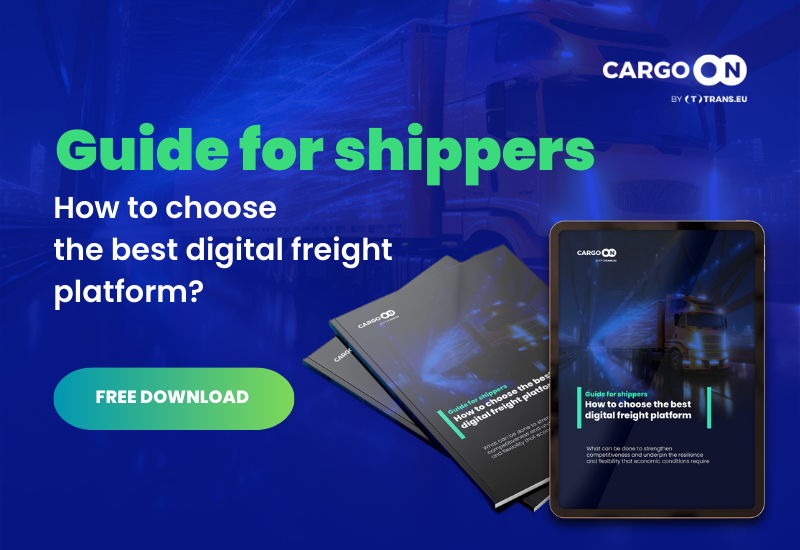Guide for shippers: How to choose the best digital freight platform?
Digitalisation of transport processes in shippers companies is no longer an option but a necessity. However, the path towards the adoption of these new tools must go hand in hand with a technological partner that guarantees a perfect execution of the process. In this guide we outline the steps to follow towards achieving this.
October 30, 2023

In recent years, digitalisation has been a significant factor in the growth of production and distribution companies in the European Union. The 2022 edition of the Digital Economy and Society Index (DESI) shows that while most of the 27 EU Member States are making progress in their digital transformation, the adoption of key digital technologies by businesses, such as Artificial Intelligence (AI) and Big Data still remains low.
There are, however, still significant challenges facing some European companies in spite of the advances in digitalisation. Small and medium-sized enterprises (SMEs) are particularly affected by the digital divide. The lack of resources, technical expertise, or resistance to change have prevented many organisations from fully embracing digital technologies.
Initiating a process of this scale can sometimes be overwhelming and choosing the right technology partner will be crucial in this process. That’s why CargoON has developed a guide to choosing the best partner for the digitalisation process of shippers, the most important points of which are summarised below:
What should we consider when choosing a digital solution?
First of all, the digitalisation process starts with the identification of areas for improvement throughout the company’s value chain. Every aspect of the business must be analysed for opportunities for improvement through digitalisation. It is therefore important to choose a tool that offers full coverage of all processes, but also allows a staggered implementation to validate the stages of implementation in terms of the benefits achieved.
The technology “partner” must be a partner with its own capabilities that understands the specific needs of the company, as well as offering standard modular solutions that allow for rapid implementation. Reputation, track record and references should also be assessed to ensure that it is reliable and capable of meeting the stated objectives.
Structural factors to consider when choosing a technology partner
- Budget: It is essential to know the budget available for the implementation of the digital solution, considering it as an investment in long-term efficiency.
- Resources: The number of human resources involved in the implementation should be another aspect to take into account. It is important to choose a solution that does not involve overstretching the available capital.
- Timing: Speed of implementation is essential. Avoiding complex solutions that commit the company’s resources for too long is crucial.
- Digital adoption capability: The company must be willing to embrace change. Managing resistance to change and promoting an open mindset are key.
Requirements that a technology partner must meet
- An ecosystem that considers all players in the supply chain: The digital platform must be able to adapt to the needs of all the stakeholders involved in the logistics chain.
- Global reach and legal coverage: The solution must have international outreach and understand the complexities of the different markets and regulations.
- Experience in the market and proprietary technology: It is essential that the technology partner has experience in the successful implementation of digital solutions and has a strong development team.
- Cost transparency: Costs should be clear and based on the volume of transactions, users and active modules, allowing effective control of expenditure.
How do I know the chosen solution is best for my business
The choice of the best digital solution is based on experience and time working with the platform. However, there are certain signs that indicate that the right decision has been made:
- End-to-end and modular digitalisation solution: The platform should cover all logistical processes and allow for a phased implementation.
- Plug and Play: The platform should be easy to connect and use, reducing implementation times and associated costs.
- Software as a Service (SaaS): The solution should be accessible in the cloud from anywhere, facilitating communication and collaboration in a remote or hybrid working environment.
How CargoON’s technology can help you on your way to digitalisation
Now that you know how important it is to embark on the path of digitalisation, we must emphasise that CargoON can help you when looking for a partner.
CargoON, part of the Trans.eu Group, is an innovative transport management system created for shippers and retailers looking to save on logistics costs and gain control over the supply chain through digitalisation and collaboration between all stakeholders. Quick and easy to implement, through the combination of its various modules, it enables optimised load allocation, access to more transport capacity, real-time visibility of transport execution and efficient dock management.
We want this guide to be not only a source of valuable information, but also a starting point for change and innovation in our industry. At CargoON, we are committed to continuing to develop technology solutions that make a difference in our industry and enable us to embark on a journey together towards logistics excellence.
FREE DOWNLOAD



